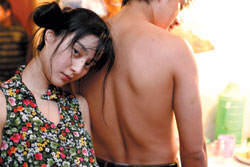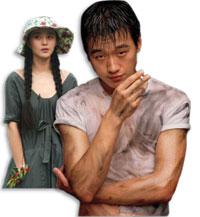When director Li Yu found out that her latest film, Apple, had been nominated at the 57th Berlin International Film Festival (also known as the Berlinale) for the Golden and Silver Bear awards, she had no time to celebrate because the film was still in its post-production stages.
"I was overwhelmingly happy at the news, but I had to re-schedule my plans and shorten post-production from three months to one month, due to the unexpected nomination," she told BJW. Apple is the fourth feature film directed by Li. The movie tells a story about the bizarre relationships and conflicts between two couples. The idea for the film came from Li and producer Fang Li, who wanted to shed light on ethical conflicts caused by people of different social statuses.
Chinese mainland actress Fan Bingbing and actor Tong Dawei (pictured above and below) play the poor couple who come to Beijing for work and struggle at the bottom of the social ladder. The wife of the couple played by Fan is an employee of the husband of another rich couple, played by Hong Kong Golden Awards Best Actor Leung Kar-fei.
"Millions of migrants come to Beijing chasing their dreams. With all the seductions and illusions, working out how to survive is a problem for everyone in the city," said Paul Schrader, president of the 2007 Berlinale jury, after watching a draft of the film. Schrader compared Chinese' booming Beijing dreams to the Gold Rush period in the United States.
This is not the first time that one of Li's films has been recognized by an international film festival. With a reputation for telling women's stories in China, Li won her first award for her debut film Fish and Elephant () in 2001 at the Venice International Film Festival and the second award at Berlin International Film Festival in 2002.
Fish and Elephant was quite controversial when it came out. The emotional drama tells the story of the lesbian relationship of a young Beijing Zoo employee, which is thrown into chaos when her unsuspecting mother arrives in town, aiming to find a husband for her. It was the first lesbian-themed mainland film, leading Li to be labelled an "underground" filmmaker.
But Li doesn't want to label her films. "When I made the film, I just wanted to tell a story about the helpless and hopeless instead of centering on lesbians in particular," she said.
Despite the criticism from some conservative critics, Li has stuck to her filmmaking style. In 2005, she returned with a visually stunning but far more conventional drama, Dam Street (), which also won her several awards abroad, including the Best Film Award at the Asian Film Festival.
 Dam Street focuses on the life of a young Chinese girl who falls pregnant while still at high school in a small, conservative Chinese town in the early 1980s.
Dam Street focuses on the life of a young Chinese girl who falls pregnant while still at high school in a small, conservative Chinese town in the early 1980s.
Born in Shandong Province, the 33-year-old director is one of just a handful of female Chinese film directors, who tends to combine reality with a female perspective in her movies. Unlike other female directors who are sensitive and sentimental, Li focuses much more on women's lives in society.
A former TV host, Li turned to documentary making five years ago. "Women are different from men, physically and psychologically," she said. "I like to capture the details of women's lives. And because I made documentaries for many years, I have a special knack for recording people's real lives."
Unlike her past films, Apple contains a lot of black humor. When the film opened last September, Hong Kong actor Leung Kar-fei joked at the opening press conference that "Apple is the seduction that God sent to us. It's human beings' original sin and the origin of all evil. So men and women shouldn't eat apples together ever!"
The film was originally called Lost in Beijing, but Li wanted a title that better expressed the story. "It is about being lost and found in the city," she said. "All of the confusion results from the seductions of the city."
Li doesn't think she is a member of the so-called six-generation directors because she believes that every director is independent and should not be categorized. "A film director is similar to an organizer," she said. "I'm like a hostess. My filmmaking process is like a party."
(China Daily 01/31/2007 page7)